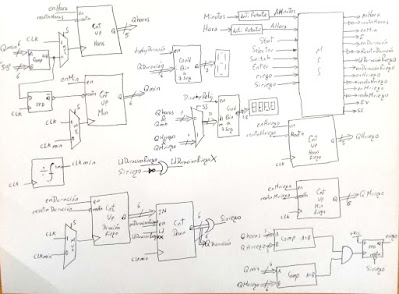▷ #Trilateration-based Indoor Location using Supervised Learning Algorithms
- ➡️ #EmbeddedSystems #ARM #Python #CProgrammingLanguage #AVR #Esp32 #Espressif #IoT #CyberPhysicalSystem #SensorNetwork #WirelessSensorNetwork #Processor #Arduino #RaspberryPi #FreeRTOS
- ⭐ https://github.com/vasanza/EmbeddedSystems
- ✅ APPEL 2022: 27th International Conference on Applied Electronics, AE #APPEL2022➡️ Presented by: Jerry Landívar & Carolina Ormaza
- ⭐ When using this resource, please cite the original publication:
- ✅ Abstract:
- The indoor positioning system (IPS) has a wide range of applications, due to the advantages it has over Global Positioning Systems (GPS) in indoor environments. Due to the biosecurity measures established by the World Health Organization (WHO), where the social distancing is provided, being stricter in indoor environments. This work proposes the design of a positioning system based on trilateration. The main objective is to predict the positioning in both the ‘x’ and ‘y’ axis in an area of 8 square meters. For this purpose, 3 Access Points (AP) and a Mobile Device (DM), which works as a raster, have been used. The Received Signal Strength Indication (RSSI) values measured at each AP are the variables used in regression algorithms that predict the x and y position. In this work, 24 regression algorithms have been evaluated, of which the lowest errors obtained are 70.322 [cm] and 30.1508 [cm], for the x and y axes, respectively.
- ✅ Conference content:
- ➡️ Introduction
- ➡️ Related Work
- ➡️ Methodology
- ➡️ Results
- ➡️ Discussion and Conclusions
✅ References:
- Andy Rick Sánchez-Villena and Valeria de La Fuente-Figuerola, "Covid-19: cuarentena aislamiento distanciamiento social y confinamiento¿ son lo mismo?" in Anales De Pediatria (Barcelona Spain: 2003), Elsevier, vol. 93, pp. 73, 2020.
- Meirui Qian and Jianli Jiang, "Covid-19 and social distancing", Journal of Public Health, pp. 1-3, 2020.
- Emre Teoman and Tolga Ovatman, "Trilateration in indoor positioning with an uncertain reference point", 2019 IEEE 16th International Conference on Networking Sensing and Control (ICNSC), pp. 397-402, 2019.
- Bernhard Hofmann-Wellenhof, Herbert Lichtenegger and James Collins, Global positioning system: theory and practice, Springer Science & Business Media, 2012.
- F Herranz, M Ocana, LM Bergasa, MA Sotelo, R Barea, E López, et al., "Sistema de localizacion gps y wifi sobre pda aplicado a un sistema de evacuacion de emergencia", Proceedings of the IX Workshop of Physical Agents, 2008.
- Elaine Rich, Kevin Knight, Pedro Antonio González Calero and Fernando Trescastro Bodega, Inteligencia artificial, McGraw-Hill, vol. 1, 1994.
- Giuseppe Bonaccorso, Machine learning algorithms, Packt Publishing Ltd, 2017.
- Pranesh Sthapit, Hui-Seon Gang and Jae-Young Pyun, "Bluetooth based indoor positioning using machine learning algorithms", 2018 IEEE International Conference on Consumer Electronics-Asia (ICCE-Asia), pp. 206-212, 2018.
- Jayakanth Kunhoth, AbdelGhani Karkar, Somaya Alma’adeed and Abdulla Al-Ali, "Indoor positioning and way finding systems: a survey", Human-centric Computing and Information Sciences, vol. 10, 12 2020.
- Sudarshan S. Chawathe, "Indoor localization using bluetoothle beacons", 2018 9th IEEE Annual Ubiquitous Computing Electronics Mobile Communication Conference (UEMCON), pp. 262-268, 2018.
- Pranesh Sthapit, Hui-Seon Gang and Jae-Young Pyun, "Bluetooth based indoor positioning using machine learning algorithms", 2018 IEEE International Conference on Consumer Electronics - Asia (ICCE-Asia), pp. 206-212, 2018.
- Guoquan Li, Enxu Geng, Zhouyang Ye, Yongjun Xu, Jinzhao Lin and Yu Pang, "Indoor positioning algorithm based on the improved rssi distance model", Sensors, vol. 18, no. 9, pp. 2820, 2018.
- Eslam Essa, Bassem A. Abdullah and Ayman Wahba, "Improve performance of indoor positioning system using ble", 2019 14th International Conference on Computer Engineering and Systems (ICCES), pp. 234-237, 2019.
- Manikanta Kotaru, Kiran Joshi, Dinesh Bharadia and Sachin Katti, "Spotfi: Decimeter level localization using wifi", Proceedings of the 2015 ACM Conference on Special Interest Group on Data Communication, pp. 269-282, 2015.
- Carolina Aguilar Aravena and Luciene Stamato Delazaria, "Solution for indoor positioning using wifi networks", Proceedings of the ICA volume 2 pages NA–NA. Copernicus GmbH, 2019.
- Jingkai Zhu and He Xu, "Review of rfid-based indoor positioning technology", International Conference on Innovative Mobile and Internet Services in Ubiquitous Computing, pp. 632-641, 2018.
- Abdul Alif Wafi Ab Razak and Fahmi Samsuri, "Active rfid-based indoor positioning system (ips) for industrial environment", 2015 IEEE International RF and Microwave Conference (RFM), pp. 89-91, 2015.
- Eduardo Luis Gomes, Mauro Fonseca, André Eugenio Lazzaretti, Anelise Munaretto and Carlos Guerber, "Clustering and hierarchical classification for high-precision rfid indoor location systems", IEEE Sensors Journal, 2021.
- Long Cheng, Hao Chang, Kexin Wang and Zhaoqi Wu, "Real time indoor positioning system for smart grid based on uwb and artificial intelligence techniques", 2020 IEEE Conference on Technologies for Sustainability (SusTech), pp. 1-7, 2020.
- Jin-Shyan Lee, Yu-Wei Su and Chung-Chou Shen, "A comparative study of wireless protocols: Bluetooth uwb zigbee and wi-fi", IECON 2007-33rd Annual Conference of the IEEE Industrial Electronics Society, pp. 46-51, 2007.
- Junhai Luo, Liying Fan and Husheng Li, "Indoor positioning systems based on visible light communication: State of the art", IEEE Communications Surveys Tutorials, vol. 19, no. 4, pp. 2871-2893, 2017.
- Mehmet Bilgi, Abdullah Sevincer, Murat Yuksel and Nezih Pala, "Optical wireless localization", Wireless Networks, vol. 18, no. 2, pp. 215-226, 2012.
- Liqun Li, Pan Hu, Chunyi Peng, Guobin Shen and Feng Zhao, "Epsilon: A visible light based positioning system", 11th USENIX Symposium on Networked Systems Design and Implementation (NSDI 14), pp. 331-343, 2014.
- Victor Asanza, Rebeca Estrada Pico, Danny Torres, Steven Santillan and Juan Cadena, "Fpga based meteorological monitoring station", 2021 IEEE Sensors Applications Symposium (SAS), pp. 1-6, 2021.
- Víctor Asanza, Enrique Peláez, Francis Loayza, Leandro L. Lorente-Leyva and Diego H. Peluffo-Ordóñez, "Identification of lower-limb motor tasks via brain-computer interfaces: A topical overview", Sensors, vol. 22, no. 5, 2022.
- Kailong Liu, Xiaosong Hu, Zhongbao Wei, Yi Li and Yan Jiang, "Modified gaussian process regression models for cyclic capacity prediction of lithium-ion batteries", IEEE Transactions on Transportation Electrification, vol. 5, no. 4, pp. 1225-1236, 2019.
- Huilin Zheng, Syed Waseem Abbas Sherazi and Jong Yun Lee, "A stacking ensemble prediction model for the occurrences of major adverse cardiovascular events in patients with acute coronary syndrome on imbalanced data", IEEE Access, vol. 9, pp. 113692-113704, 2021.
- Constantine, A., Asanza, V., Loayza, F. R., Peláez, E., & Peluffo-Ordóñez, D. (2021). "Bci system using a novel processing technique based on electrodes selection for hand prosthesis control". IFAC-PapersOnLine, 54(15), 364-369.
Read related topics
- ✅Artificial Intelligence #AI based on #FPGA
- ✅ Introduction to Embedded Systems
- ✅ Programming Embedded Systems
- ✅ Machine Learning #ML using #Matlab
- Paper: IoT SENSOR NETWORK
- ➡️ #RaspberryPi-based #IoT for #shrimp farms Real-time remote monitoring with automated system
- ➡️ Monitoring a turkey hatchery based on a #cyber_physical_system
- Paper: EMBEDDED SYSTEM
- ➡️ Performance Comparison of Database Server based on #SoC #FPGA and #ARM Processor
- ➡️ #FPGA Based Meteorological Monitoring Station
- ➡️ Behavioral Signal Processing with Machine Learning based on #FPGA
- ➡️Implementation Of Automated System For The Reservoir 66 of the Irrigation System Chambo Guano
- ➡️ Monitoring of system memory usage embedded in #FPGA
- ➡️ 2020 PAO1: Proyectos Propuestos
- ➡️ #FPGA projects for Engineering Students
- Sensor networks for #Agriculture (Paper)
- #PID control for DC motor
- #PID control for angular position
- Writing letters through eye movement using Machine Learning #ML
- EyeTracker #Classification of subjects with Parkinson's using Machine Learning #ML
- #EEG + #FlexSensor Medical Equipments - #HTMC
- Digital synthesizer
- Microcontroller Architecture #PIC #16F877A
- Behavioral signal processing with Machine Learning #ML (Paper)
- Phrases recognition with Machine Learning #ML (InnovateFPGA)
- Alphabet letters recognition with #MachineLearning using #EMG signals (Paper)
- #EMG signal #Classification with #MachineLearning (Paper)
- #Epileptic seizure prediction with #MachineLearning #ML
- #EEG signal processing with #MachineLearning #ML (Paper)
- #EEG + #EMG signal processing with #MachineLearning #ML
























Comentarios
Publicar un comentario